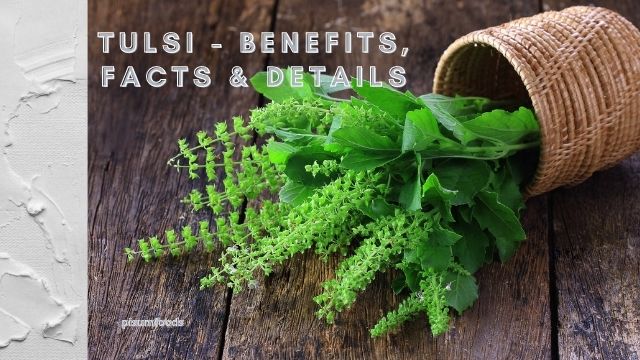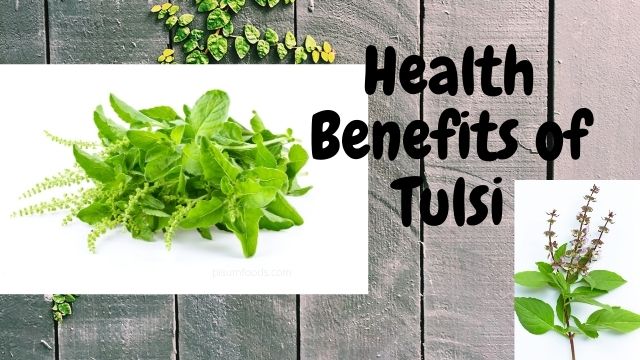 Translate
Translate Translate
TranslateRightly described as the “queen of herbs”, basil or as we call it tulsi, is medically and spiritually of great importance. Its origin is said to be from North Central India, and now the cultivation occupies over a land of 25000 hectares. The benefits of tulsi have been recognized ages ago. It has been referred to as the “elixir of life” in Ayurveda. The Hindus have various theories about the origin of tulsi. The one-story revolves around the story of Samudra Manthan. When finally the demons we’re defeated, Lord Vishu shed happy tears that fell in the ambrosia, which became tulsi.
Many other such stories have been built around the origin of the holy basil leaves. Owing to its sacred properties, many Hindus have a tulsi plant outside their homes. Basil leaves are remarkably sacred to the Hindus.
A few rare and interesting facts about tulsi are stated below:
In the Egyptian tradition of mummifying, basil leaves were used for the process of embalming.
Basil leaves are believed to be an antidote for snake bites.
In Christianity, basil is believed to be found at the tomb of Christ after his resurrection.
Basil leaves are an unmistakable source of vitamin K.
Basil is a sign of love in Italy.
Basil is put on the chest of the dead in the Hindu religion as a passport of heaven.
And here are some details about Tulsi.

Tulsi is a culinary herb belonging to the mint family. It contains minerals such as copper, iron, calcium, and potassium. The first origin is traced to Southeast Asia and Africa. Different types of Tulsi include sweet basil, Thai basil, lemon basil, and African blue basil.
The Health benefits of basil leaves have been passed on to us from Ayurvedic ages. Tulsi has been a great medicinal and holy herb. Some of the benefits of the holy basil are listed below:
The extracts of tulsi leaves, increase the natural germ-killing bodies in our system and hence proves to be a great immunity booster. It is a source of so many vitamins and minerals as well. It keeps viruses, fungus, and bacteria at a check.
Basil leaves promote sweating in the body and their antibacterial properties help in bringing down the fever and reducing body pain.
Adding basil leaves and ginger to a hot cup of water, and consuming it as a “Kaadha” is a common “grandma’s hack” for curing a cold and cough.
Tea made using basil leaves has properties that can reduce the allergic reactions of bronchitis and asthma.
Tulsi is said to be good for psychological stress because of its antidepressant property. Also, it has positive effects on memory.
A combination of neem and tulsi proved to be a good agent for lowering blood pressure.
Basil leaves have a high amount of eugenol that helps in curing cancer. Various theories are being studied for a perfect fit in the case.
Due to the high antioxidant properties of basil leaves, they help in lowering blood lipid content. They also help in reducing the chances of stroke.
Tulsi is great for promoting the secretion of insulin and affects the functioning of pancreatic beta cells, hence controlling diabetes.
Adding basil leaves powder in honey and consuming it can help get rid of kidney stones. To balance the uric and mineral content in the kidney, one can boil the leaves in water and consume it.
Tulsi leaves stimulate the secretion of digestive enzymes, resulting in the cure of gastrointestinal disorders in the body.
Apart from being a great natural cure for a number of disorders in the body, basil leaves also have some other benefits. Let’s have a look at the other benefits of holy basil:

Making a paste of basil leaves with sandalwood and water can help cure acne and the swelling and pain that comes with acne. It helps with pore cleansing as well. These are the chief benefits of tulsi for the skin.
The oil from basil leaves works greatly over the thinning of hair and stimulates hair growth. The benefits of tulsi for hair also include a reduction in itchiness and dandruff.
Animal research on rabbits shows a considerable deduction in fat molecules after they consume fresh holy basil leaves. The benefits of tulsi for weight loss are a result of its property of providing metabolism. Having tea infused with basil leaves also eliminates toxins from the body.
Basil leaves are good on the eyes because of their soothing properties that help to protect the eye from environmental damage. Another benefit of tulsi for the eyes is that it helps in fighting conjunctivitis.
The benefits of tulsi for premature aging of the skin are as real as weird they sound. Boiling or crushing the basil leaves in water and consuming it every morning can give the skin a youthful glow, rejuvenating it.
Benefits of tulsi for quitting smoke involve its anti-stress properties. It is believed to have a remedy for the stress that one experiences when they try to quit smoking or when they have an urge to smoke.
Apart from the holiness of basil leaves, the Ayurveda has great evidence of tulsi being a highly effective medicine for a number of problems in the human body relating to the stomach and respiratory tract. Another uses of tulsi, as stated above are precisely the ones that are commonly used in daily life. Medicinal uses of tulsi, which is basil leaves or it’s water, are a great source of a number of remedies for disorders and helps to sharpen the brain.
Holy Basil’s uses are not just medicinal, but also spiritual. The Hindus believe that whoever comes in contact with the smell or aroma of basil leaves planted in the house, can benefit from it. It helps to spread positivity and get rid of the sins. It’s believed that worshipping tulsi is similar to worshiping all the gods together.
Consuming tulsi comes in a number of ways. The most common way includes boiling the leaves in water and then drinking that water. The other ways are listed below :
Chewing the leaves raw.
Crushing the leaves with water and consuming it like a juice.
Making tea and or adding lemon juice to it.
Mixing it with ghee or honey.
As much as Tulsi is sacred and beneficial, there is no coin with one side. Tulsi has some side effects as well. A few of the side effects of tulsi are stated below. After all, precautions are any day better than a cure.
Tulsi contains an element named estragole, which can cause the uterus to contract, making it hazardous for pregnant women.
Tulsi affects the menstrual cycle of women and in some cases, it is a reason for diarrhea as well.
It can affect the sugar levels in the body, making them low. If a patient is already taking medicines for low sugar levels, it can decrease it further, causing more harm.
Tulsi lowers the sperm count, resulting in infertility issues in both the genders. Though this study has not been based on humans, studies show that animals have been affected by this for sure.
According to WHO, tulsi leaves cause liver damage.
Chewing basil leaves causes teeth staining.
Tulsi has a strong pungent taste which also results in acidity if not taken with an adequate amount of water.
So before consuming basil leaves, one should keep in mind the following points and make sure that there is no damage done.
Over the years, tulsi has been cultivated in many parts of the world. Over 41 ports go for tulsi export from India every year. The global market for basil leaves reached USD 59 million in 2019. Tulsi export from India is easy and quick, definitely a good market for the money. If you wish to have a global reach, you can go forward and check out Pisum Food Services. They deal with the export and import of food products and are really reliable. They are best for the export of tulsi.They have easy stepwise form filling and you're an exporter in no time. They are well known for all the techniques for storage and preservation. Their service is timely and nothing can beat the amount of customer satisfaction they reach out for. Herb export from India could have never been this easy. Check out their website for another whole lot of things that they are perfect at.